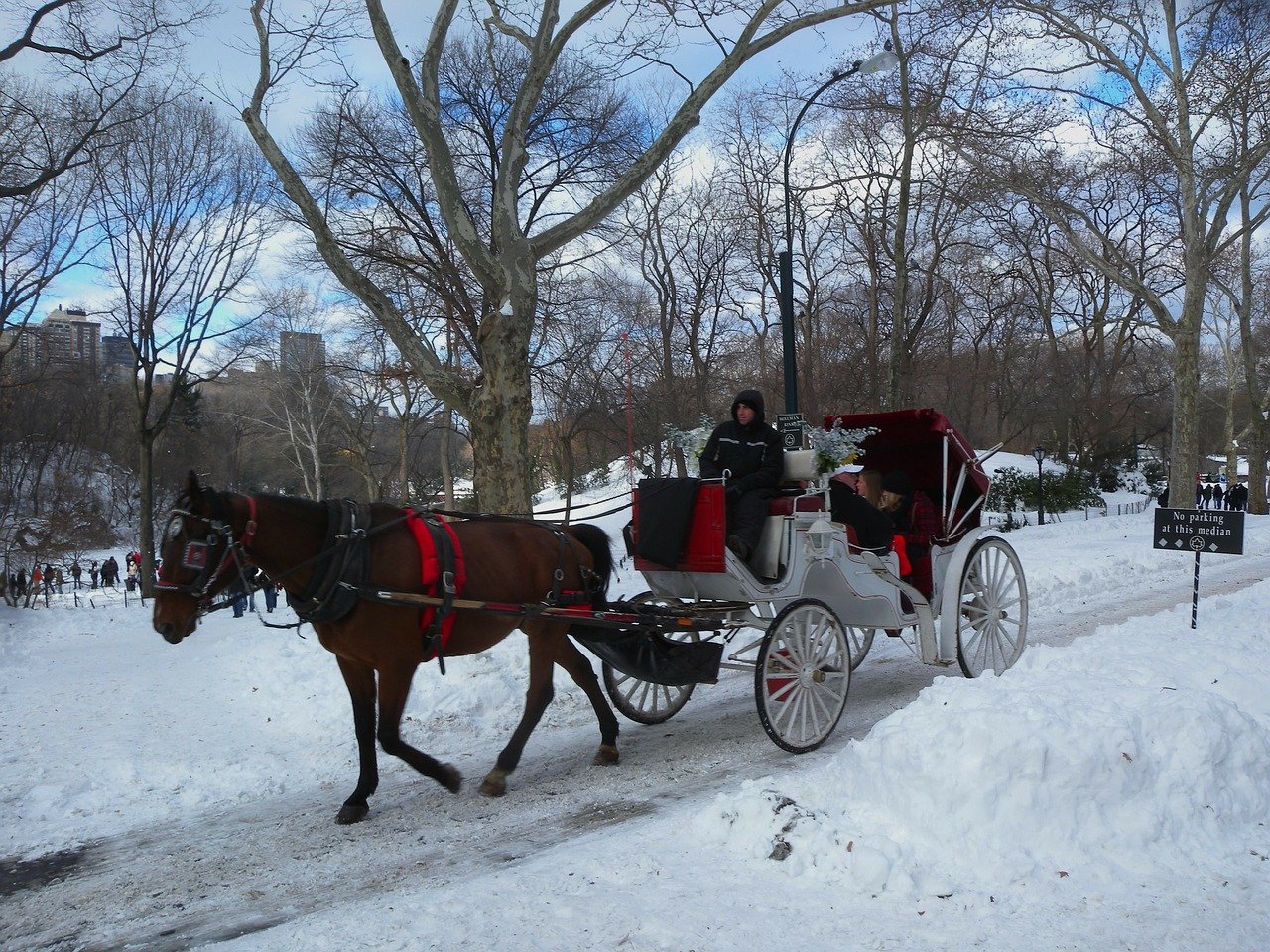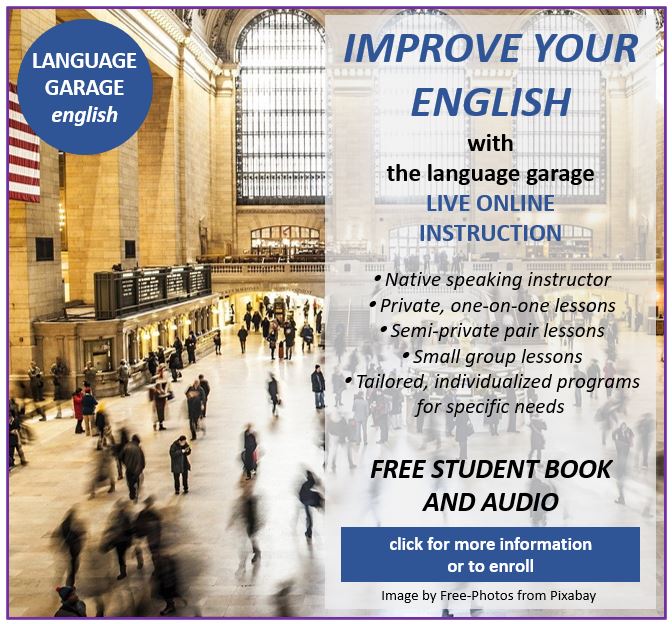It’s freezing! English Winter Vocabulary
It’s winter in the northern hemisphere, so it’s a good time to look at some English vocabulary and expressions that will help you talk about cold weather, snow, and short days.
I’m Cold! English Winter Vocabulary for Winter Weather
Let’s start with some basic English winter vocabulary that will help you talk about cold winter weather. Frigid is very cold, and bitter cold is so cold that it hurts. If you’re very cold, you can say I’m freezing! When you’re so cold that your body is shaking, that’s called shivering. If your teeth are hitting one another, that’s called chattering. If you’re so cold that you lose feeling in your toes, you can say that they’re numb, or that you can’t feel them. Frost bite is a serious medical problem caused by the cold.
- It’s cold / freezing / frigid / bitter cold outside.
- I’m cold! / I’m freezing!
- It’s chilly inside! Turn up the heat!
- I’m shivering. / My teeth are chattering.
- My toes/fingers are numb. / I can’t feel my toes/fingers.
- Don’t get frost bite! Put on some heavy gloves.
Winter Weather
If it’s only snowing a very little bit, you can say that there’s a light dusting of snow. Steadily means continuously, for a while, and heavily means a lot. A blizzard is a very heavy snowstorm with lots of snow and wind, a squall is a heavy but fast-moving storm that doesn’t last for a long time, and snow showers are periods of light snow.
- It’s snowing.
- There’s a light dusting of snow. / It’s snowing steadily. / It’s snowing heavily.
- A snow squall is passing through.
- There will be snow showers all afternoon.
- We’re going to have a blizzard this weekend.
Sleet is rain that starts to freeze before it hits the ground, and freezing rain is rain that freezes when it touches the ground. Hail is different; it’s big pieces of ice that form in thunderstorms in the summer. An ice storm is a winter storm with sleet and freezing rain. Ice storms coat trees and other things in ice.
- It’s sleeting. / There’s freezing rain.
- That’s not hail; it’s sleet.
- Don’t drive tonight. We’re going to have an ice storm so the roads will be dangerous.
If it’s very windy, you can say that the wind is howling. Howl is the sound that a wolf makes. A gust is a stronger wind that’s faster or more powerful than the rest of the wind.
- It’s windy. / The wind is blowing.
- The wind is blowing hard. / The wind is howling.
- A big gust of wind knocked over the tree.
Freeze is irregular: freeze, freezing, froze, frozen. Melt is the opposite. Thaw is to melt after a long, seasonal freeze.
- The lake freezes every winter.
- The lake is freezing, but the ice isn’t thick enough to walk on yet.
- The lake froze last night.
- The lake is frozen.
- The snow is melting. / The snow melted this morning.
- The ground hasn’t thawed yet; it’s still frozen.
I Love the Winter. English Winter Vocabulary for People Who Like Winter
For many people, winter is a beautiful season. To blanket means to cover something, like a blanket. When there’s snow or ice, two verbs that describe sparkling or flashing light are glisten and glitter. Twinkle also describes light, especially the changes in brightness of a star.
- The snow is beautiful. / The snow is gorgeous.
- The snow blankets the earth in white.
- There’s a deep blanket of snow.
- The sun glistens off of the snowy fields.
- Ice crystals glitter in the sunlight.
- The air is crisp and clear.
- The stars twinkle clearly in the winter sky at night.
Let’s Go Skiing!
Winter sports are another reason to love winter!
- I’m going skiing this weekend.
- I prefer cross-country skiing.
- Do you feel like going snowboarding with us this weekend?
- Have you ever gone snowshoeing?
- Let’s go sledding down the hill.
- There’s an old-fashioned horse-drawn sleigh!
- Let’s go ice skating on the pond.
- Let’s have a snowball fight!
- The kids are building a snow fort.
- Let’s make a snowman!
Drive Carefully! The Roads are Icy.
Of course, winter isn’t all fun and games. Some people just don’t like the weather. After all, it can be dangerous, and icy roads can be very dangerous, or treacherous. There are patches – places – of ice, and snow drifts – built by the wind – or piles – left by snowplows – are all over the place. After the snow starts to melt or is mixed with salt and dirt, it becomes slush, a wet and unpleasant mixture!
- I don’t like driving in the winter. / I hate driving in the snow.
- The roads are icy and dangerous.
- The roads are treacherous!
- I have to shovel the driveway.
- I don’t like to shovel. Do you have a snowblower?
- Has the snowplow come yet? / Have they plowed the roads yet?
- My car slid on a patch of ice.
- I slid into a snow drift / a snow pile.
- I slipped on the sidewalk.
- I stepped into a puddle of slush!
- I can’t get up the driveway because it’s too icy.
I Can’t Stand Winter. English Winter Vocabulary for People Who Don’t Like Winter
Some people don’t like winter because it’s dark and depressing.
- I can’t stand the snow. / I hate the snow.
- The sun sets too early and the days are too short.
- I miss the sun.
- Winter weather is depressing / gloomy / dreary.
- Winter weather depresses me. / I’m depressed by winter weather.
Winter Clothes
If you have to go outside, you need to dress appropriately. You’ll probably wear: a winter coat, a hat, a scarf, gloves, mittens, and boots. You can describe winter clothes as thick, heavy, or warm. Thermals, also called thermal underwear or long johns, are an extra layer of very warm clothes to wear on bitter cold days.
- I need to put on my heaviest / thickest / warmest coat today.
- I need a hat and gloves today.
- This coat isn’t heavy enough! It’s too light.
- Do you have waterproof boots?
- I’m wearing layers. / I’m wearing a sweater and a coat.
- It’s so cold I’m wearing my thermals / thermal underwear / long johns.
Cozy, Quiet Winter Evenings
Even if you dislike winter, you can still feel warm and cozy. You can sit next to a roaring fire, and maybe enjoy a cup of tea or better yet, a cup of hot chocolate / hot cocoa. Just get a blanket or a quilt, maybe curl up with a good book, and you’re ready to make the most out of the cold days and long nights. It’s only a few more months until the spring!
- It’s warm and cozy in the house.
- Let’s make a fire in the fireplace.
- Let’s have hot chocolate / hot cocoa in front of a roaring fire.
- I’m warming up next to the fire.
- Do you have a blanket or a quilt?
- Tonight I’m going to curl up with a good book.
Get on the road to better English with the Language Garage!
We hope you’ve enjoyed learning some English winter vocabulary. If you’d like to learn more:
- Create a free Language Garage account to access tons of English vocabulary, grammar, and culture.
- Follow us on Facebook, LinkedIn, BlueSky, Twitter, Threads, Instagram, or Pinterest. We publish lots of English vocabulary, grammar, and culture notes, so it’s a great way to pick up some new vocabulary and practice.
- Check out our other posts on English language, culture, and more.
- Enroll in affordable, flexible, and personalized private online English lessons or sign up for a small group online English class.
Image by David Mark from Pixabay






